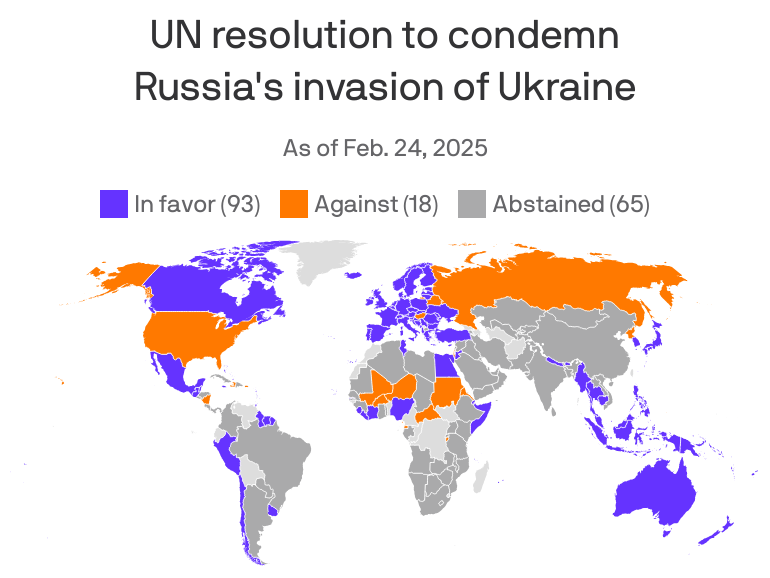Context
In a significant shift, the United States joined Russia in voting against a UN resolution calling for de-escalation, an early cessation of hostilities, and a peaceful resolution to the ongoing war in Ukraine. Proposed by Ukraine and backed by European nations, the resolution was passed despite US opposition, revealing notable geopolitical divides. While European countries and the G7 (excluding the US) supported the resolution, India abstained from the vote.
The Resolution and Voting Outcome
Titled "Advancing a Comprehensive, Just, and Lasting Peace in Ukraine," the resolution secured 93 votes in favor, with key European nations such as Germany, the UK, and France supporting it. However, India, along with several other countries, abstained.
India’s Stance
India’s decision to abstain aligns with its long-standing policy of non-alignment and strategic autonomy. Since the onset of the Russia-Ukraine conflict, India has carefully maintained a balanced approach—avoiding direct condemnation of Russia while fostering strong diplomatic and economic ties with Western nations.
By abstaining, India continues its strategy of avoiding geopolitical entanglements, preserving its flexibility to engage with both Russia and Ukraine. This neutrality ensures that India safeguards its national interests while keeping open the possibility of mediating future peace negotiations.
The US's Changing Position
The US's vote against the resolution marks a departure from its earlier stance. Under the Biden administration, the US had consistently aligned with European nations in condemning Russia’s invasion.
However, recent developments, particularly the influence of former President Donald Trump, have contributed to a shift in policy.
Trump’s previous administration had indicated openness to direct negotiations with Russia, and his continued political influence appears to be shaping US foreign policy in that direction.
Impact of the Resolution
The UN General Assembly vote highlights the international community’s divided perspectives on the Ukraine conflict. While Western powers and the G7 remain firmly behind Ukraine, countries such as India, China, and the BRICS bloc have maintained neutral positions. This trend reflects the broader emergence of a multipolar world order, where many nations seek to assert strategic autonomy rather than align strictly with Western-led geopolitical frameworks.
Despite opposition from the US and Russia, the resolution’s passage underscores the global call for a peaceful resolution. UN Secretary-General António Guterres reiterated that the war not only threatens European security but also challenges the fundamental principles of the United Nations.
Conclusion
The vote on the Ukraine resolution highlights deepening geopolitical divisions. The US's shift in position, voting alongside Russia, signals evolving global power dynamics, with countries like India and China adopting more cautious, independent stances. While the resolution passed with significant support, achieving a peaceful resolution to the conflict remains a complex challenge. As the war enters its fourth year, the divided vote reflects the diplomatic hurdles ahead, with no clear consensus on the path to lasting peace.








